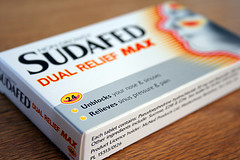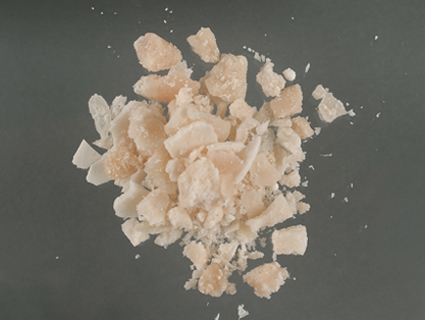
<a href="http://www.flickr.com/photos/imcomkorea/6924929159/sizes/z/in/photolist-bxW5bk-ceGZCm-eCZUU-69Jx1b-5MBnZZ-ejv4rU-8xAu1a-7fB2mm-8srE1K-gw4fi-7x74H8-hF2Yo-hH94Q-eUyx1-3GbHd-hH94S-hqKUs-5wpuZw-hUgbN-eCZYE-7seffT-eCZWK-eCZW5-eCZXZ-eCZXB-8nSakk-j3w6R-5hJG8T-8cwRJt-8cAcjw-8cwRHM-8cAp8s-6URVFg-6Qjf4S-5f51Dd-7E7ihv-7Eb8Rj-5QvzpL-MzpH-cqX2DC-7GCdRH-dqZ9ux-7Y3zEX-5ZL2F7-FpmQj-Fpo5z-Fpo4F-6jTg13-8wksCq-86ejsa-6YdJj6/">US Army Korea</a>/Flickr
As of last year, according to a report released today by the American Civil Liberties Union, more than 3,200 people were serving life in prison without parole for nonviolent crimes. A close examination of these cases by the ACLU reveals just how petty some of these offenses are. People got life for, among other things…

- Possessing a crack pipe
- Possessing a bottle cap containing a trace amount of heroin (too minute to be weighed)
- Having traces of cocaine in clothes pockets that were invisible to the naked eye but detected in lab tests
- Having a single crack rock at home
- Possessing 32 grams of marijuana (worth about $380 in California) with intent to distribute
- Passing out several grams of LSD at a Grateful Dead show
- Acting as a go-between in the sale of $10 worth of marijuana to an undercover cop
- Selling a single crack rock
- Verbally negotiating another man’s sale of two small pieces of fake crack to an undercover cop
- Having a stash of over-the-counter decongestant pills that could be used to make methamphetamine
- Attempting to cash a stolen check
- Possessing stolen scrap metal (the offender was a junk dealer)—10 valves and one elbow pipe
- Possessing stolen wrenches
- Siphoning gasoline from a truck
- Stealing tools from a shed and a welding machine from a front yard
- Shoplifting three belts from a department store
- Shoplifting several digital cameras
- Shoplifting two jerseys from an athletic store
- Taking a television, circular saw, and power converter from a vacant house
- Breaking into a closed liquor store in the middle of the night
- Making a drunken threat to a police officer while handcuffed in the back of a patrol car
- Being a convicted felon in possession of a firearm
- Taking an abusive stepfather’s gun from their shared home
These are not typically first offenses, but nor are they isolated cases. The vast majority (83 percent) of life sentences examined by the ACLU were mandatory, meaning that the presiding judge had no choice but to sentence the defendant to a life behind bars. Mandatory sentences often result from repeat offender laws and draconian sentencing rules such as these federal standards for drug convictions:
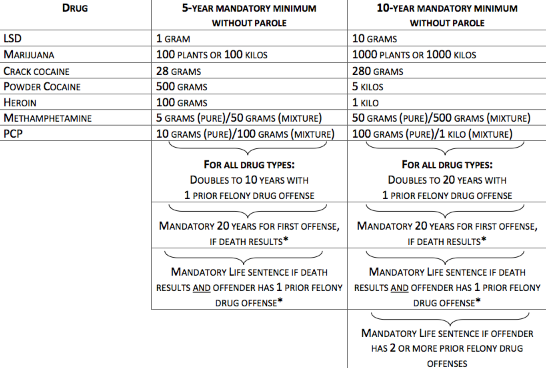
The data examined by the ACLU comes from the federal prison system and nine state penal systems that responded to open-records requests. This means the true number of nonviolent offenders serving life without parole is higher.
What’s clear, based on the ACLU’s data, is that many nonviolent criminals have been caught up in a dramatic spike in life-without-parole sentences.
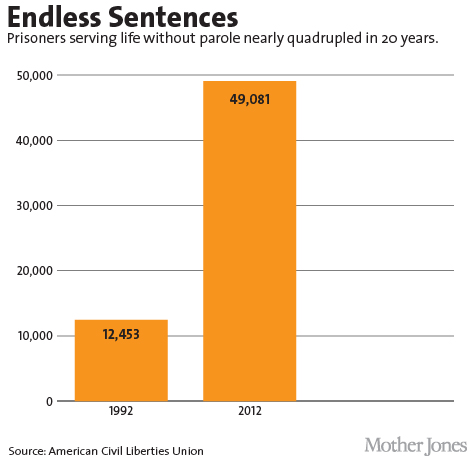
Among the cases reviewed, the vast majority were drug-related:
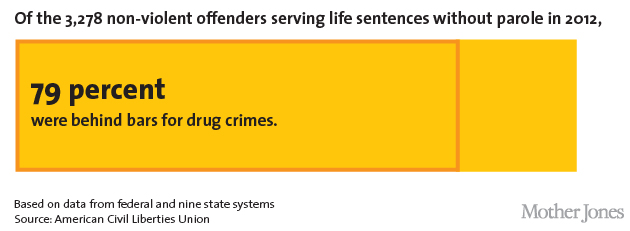
And most of the nonviolent offenders sentenced to life without parole were racial minorities.
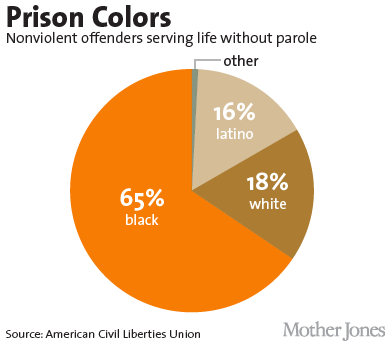
All graphics by Associate Interactive Producer Jaeah Lee
Obviously, housing all of these nonviolent offenders isn’t cheap. On average, for example a single Louisiana inmate serving life without parole costs the state about $500,000. The ACLU estimates reducing existing lifetime sentences of nonviolent offenders to terms commensurate with their crimes would save taxpayers at least $1.8 billion.
In August, Attorney General Eric Holder unveiled a reform package aimed at scaling back the use of mandatory minimums for nonviolent drug offenders. As Dana Liebelson noted:
[U]nder Holder’s new policy, mandatory minimums as they apply to specific quantities of drugs will no longer be used against offenders whose cases do not involve violence, a weapon, and selling to a minor, and they will also not be used against offenders that do not have a “significant criminal history” and ties to a “large-scale” criminal organization.
Prison reform advocates say Holder’s actions don’t go far enough. They want the Obama administration to commute the sentences of the thousands of nonviolent offenders now locked away forever. And they support legislation such as the Justice Safety Valve Act, a bill introduced in March by Sens. Patrick J. Leahy (D-Vt.) and Rand Paul (R-Ky.) that would enable judges to hand out sentences lower than the mandatory ones.
“Holder’s remarks carry more of a symbolic significance,” says ACLU deputy legal director Vanita Gupta, “but the problem needs to be addressed by Congress.”

